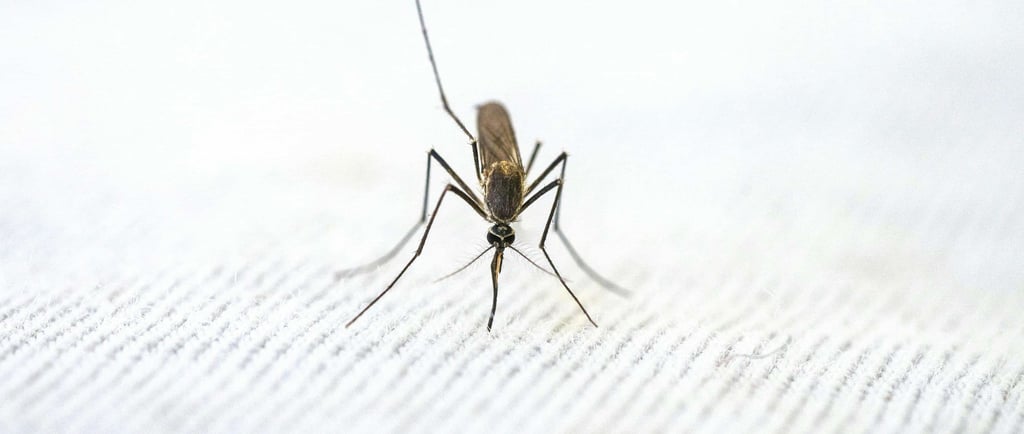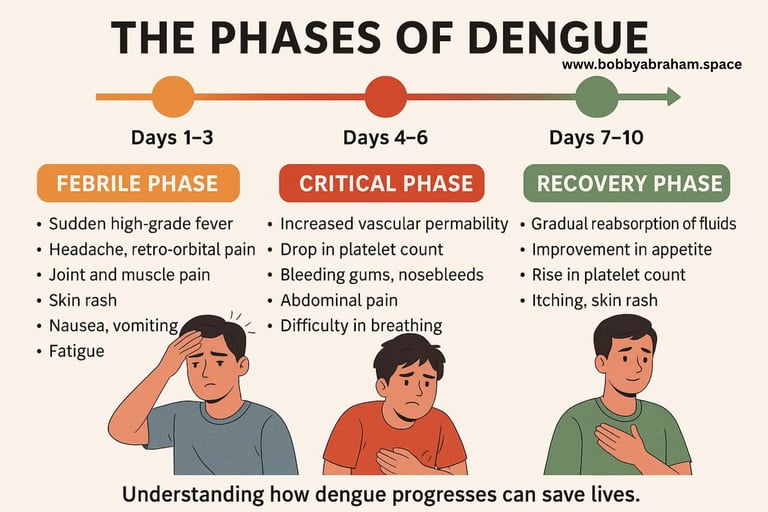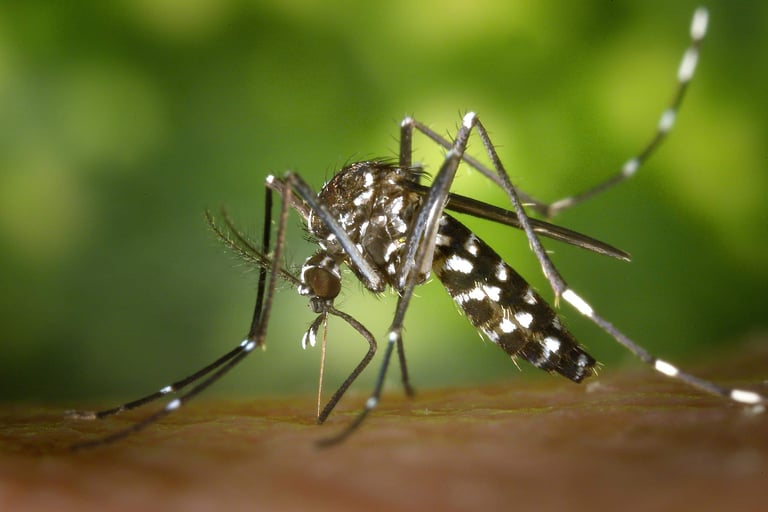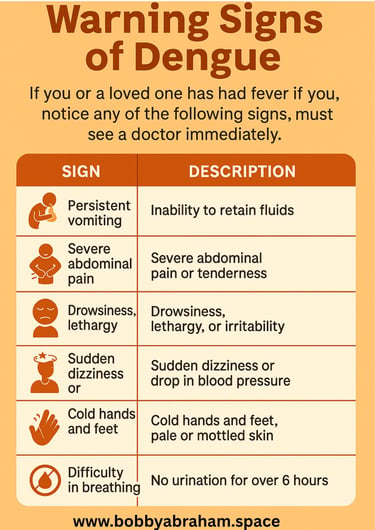🦟 Dengue Fever: What You Need to Know – A Doctor’s Perspective
Learn how to recognize dengue symptoms early, spot red flag warning signs, and prevent deadly complications. A doctor’s guide to staying safe during dengue season—because awareness can save lives.


As a physician, every monsoon season brings with it a familiar concern—a spike in cases of Dengue fever. I've seen otherwise healthy people land in the ICU due to a lack of awareness about the red flags. Dengue, often called "breakbone fever," is more than just a viral fever. It's a disease that needs timely recognition, care, and prevention.
In this blog, I want to talk to you—as your doctor and well-wisher—about what dengue really is, how to recognize danger signs, and most importantly, how we can prevent avoidable deaths due to this mosquito-borne illness.
🌡️ What is Dengue Fever?
Dengue is a viral infection transmitted by the bite of the Aedes aegypti mosquito. These mosquitoes are most active during the day, especially early morning and late afternoon. The disease is caused by one of four closely related viruses (DENV-1 to DENV-4). A person can get infected with dengue multiple times, and each infection can be more dangerous than the previous.
Know your enemy: The dengue-spreading Aedes mosquito. Credits:Pixabay
🩺 The Spectrum of Dengue Illness: Not All Fevers Are the Same
Dengue is not a one-size-fits-all illness. It progresses in three clinical phases:
1. Febrile Phase (Days 1–3)
Sudden high-grade fever (often >102°F)
Severe headache, retro-orbital (behind the eye) pain
Joint and muscle pain: The fever is often referred to as breakbone fever because of the severe joint pains that accompanies the fever.
Skin rashes
Nausea, vomiting
Fatigue
🔍 At this stage, most people assume it's a viral flu, which can be risky if dengue is not suspected.
2. Critical Phase (Days 4–6)
This is the most dangerous phase, and ironically, fever may subside, falsely giving a sense of recovery.The central process that drives this phase of dengue is the Plasma leakage. This occurs because the blood vessels become leaky and leaks fluid into the surrounding space.
But internally, things may worsen:
Increased vascular permeability: plasma leaks from blood vessels (Plasma is the fluid component of the blood)
Drop in platelet count and rise in hematocrit (Hematocrit is the red cell component of the blood and it appears risen due to the plasma leakage and resultant dehydration)
Accumulation of fluid in lungs or abdomen (This is also due to plasma leakage)
Bleeding gums, nosebleeds, blood in vomit or stool
Restlessness or drowsiness
Sudden drop in blood pressure
⚠️ This is when patients are most at risk of developing Dengue Hemorrhagic Fever (DHF) or Dengue Shock Syndrome (DSS)—both of which are life-threatening.
3. Recovery Phase (Days 7–10)
Gradual reabsorption of leaked fluids. hematocrit may fall at this phase because of the dilution effect
Platelet count begins to rise
Appetite improves
Rashes may peel off or itch
💡 However, fluid overload can happen if IV fluids were not managed carefully.
🚨 Warning Signs: When to Worry
If you or a loved one has had fever and you notice any of the following signs, you must see a doctor immediately:
Persistent vomiting or inability to retain fluids
Severe abdominal pain or tenderness
Drowsiness, lethargy, or irritability
Bleeding from gums, nose, or in stool/urine
Sudden dizziness or drop in blood pressure
Cold hands and feet, pale or mottled skin
Difficulty in breathing
No urination for over 6 hours
These red flags indicate a progression towards severe dengue and require urgent hospital care.
🧴 How Can You Prevent Dengue?
You can't prevent the virus itself once infected—but you can certainly prevent the mosquito bite that causes it.
✅ 1. Avoid Mosquito Breeding
Empty stagnant water in coolers, flower pots, coconut shells, birdbaths, and tires.
Change water in vases every 2–3 days.
Keep water tanks covered tightly.
Use larvicidal chemicals in the stagnant water bodies if needed.
✅2. Protect Yourself from Bites
Wear full-sleeved clothes, especially during daylight hours.
Use mosquito repellents (DEET-based creams or sprays).
Install window screens and mosquito nets.
Use mosquito coils or vaporizers indoors.
✅ 3. Community Action
Dengue is a community-level problem. One uncovered pot in a neighbor’s yard can become a breeding ground. Work with your resident’s associations and local health officials for regular fogging and inspection drives.
🧠 Common Myths Busted
❌ “I don’t need to worry unless there’s bleeding.”
✅ Many patients go into shock or develop complications without any visible bleeding.
❌ “Papaya leaf extract cures dengue.”
✅ There is no scientific evidence to support this. Stay hydrated, and follow your doctor’s advice.
❌ “Antibiotics will help me recover faster.”
✅ Dengue is a viral illness. Antibiotics have no role unless there is a secondary bacterial infection.
💧 The Golden Rule: Stay Hydrated
Dehydration is a silent killer in dengue. Oral fluids like ORS, coconut water, lemon water, soups, and juices are your best allies. Avoid caffeinated drinks or alcohol. In case of vomiting or persistent weakness, IV fluids may be needed—but must be monitored by trained professionals to avoid fluid overload.
🏥 When to See a Doctor?
If you have:
Fever for more than 2 days in the monsoon season
Symptoms of muscle or eye pain with rash
Suspected dengue based on home testing kits (though not always reliable)
Any red flag signs mentioned above
💬 Please don't wait until you feel too weak to walk. Dengue can go downhill fast. Early intervention saves lives.
📈 Why Does Dengue Kill?
Dengue deaths are mostly due to late presentation, delayed recognition of red flags, inadequate hydration, or improper fluid management. With timely care, the mortality rate of dengue is less than 1%. But without awareness and action, this number goes up.
🙏Final Thoughts
Dengue is preventable, manageable, and survivable—but only if we act smartly. My request to you is simple:
Stay informed.
Be alert for warning signs.
Seek medical attention early.
Spread awareness, not panic.
As your doctor and someone who’s seen families lose loved ones to something avoidable, I urge you to take dengue seriously—not with fear, but with informed action.
Stay safe, stay hydrated, and remember: prevention starts at home.
Dr. Bobby Abraham, MD
Internal Medicine | Public Health Advocate | Wellness Blogger
Bringing you real, science-backed advice from the heart of clinical practice.






